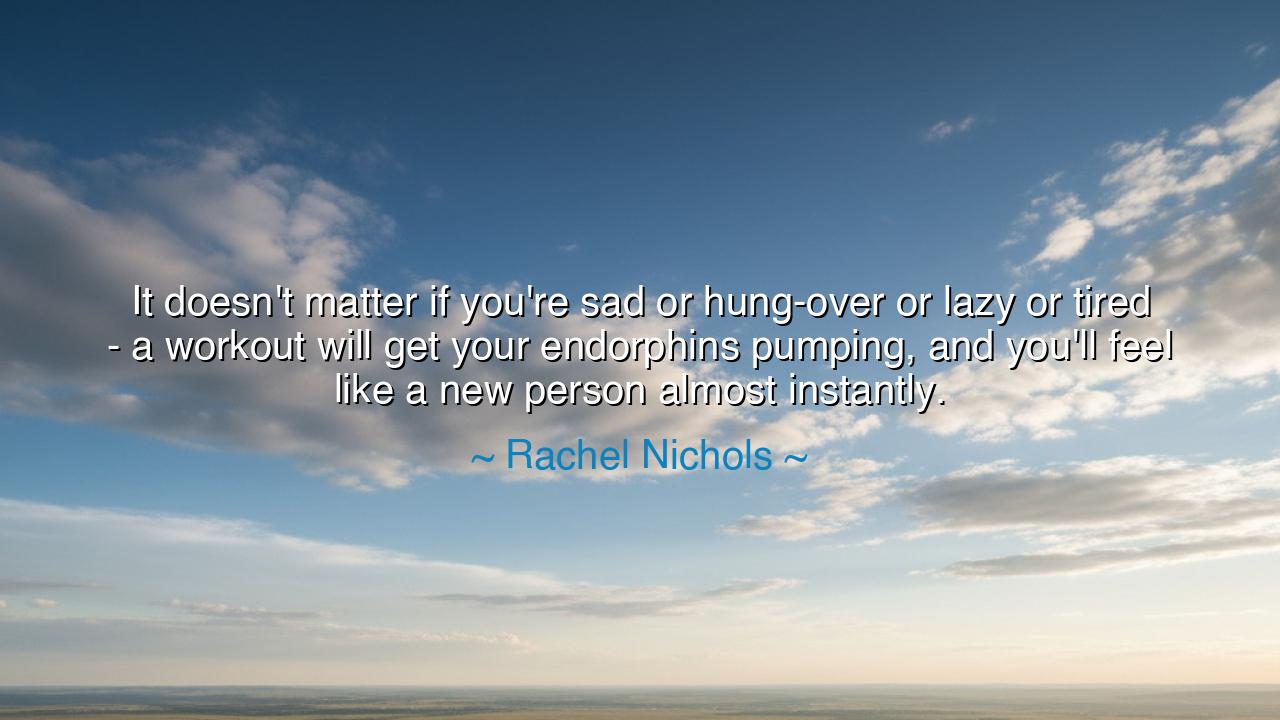
It doesn't matter if you're sad or hung-over or lazy or tired - a
It doesn't matter if you're sad or hung-over or lazy or tired - a workout will get your endorphins pumping, and you'll feel like a new person almost instantly.






Hear the words of Rachel Nichols, spoken with clarity and strength: “It doesn’t matter if you’re sad or hung-over or lazy or tired—a workout will get your endorphins pumping, and you’ll feel like a new person almost instantly.” Though clothed in modern language, this truth is ancient. It reminds us that the body, when stirred into movement, can heal the spirit, and that labor, though difficult at first, unlocks renewal. For within us is a hidden fire, and it is awakened not by stillness, but by action.
The ancients knew this well. The warriors of Sparta trained daily, not merely to strengthen the body for battle, but to harden the spirit against despair and weakness. When a soldier felt weary, when the heart was heavy, the act of discipline—of pressing forward despite tiredness—became its own medicine. In movement, they found renewal. So too does Nichols declare: when you feel broken or heavy with sorrow, let the body move, and the heart will follow. The sweat of labor is not only for the flesh—it is for the soul.
History gives us vivid examples. Theodore Roosevelt, stricken with frailty in childhood, was told by doctors to live a quiet, delicate life. But he refused. Through boxing, riding, hiking, and relentless workouts, he built not only muscle but courage, transforming himself into a man of vigor and vitality. He called this the “strenuous life,” and it became his creed. Nichols echoes this same wisdom: that even when one is weary, sick, or dulled by excess, the discipline of movement restores the spirit and makes one feel “like a new person.”
The secret is in the body’s own design. In the act of exercise, endorphins—the chemicals of joy and resilience—are released. The ancients spoke of it not in science, but in poetry: the runner’s high, the warrior’s thrill, the farmer’s satisfaction after toil. They knew that after labor came a strange peace, a sense of wholeness, as if the body, having struggled, rewarded the soul with calm. Thus Nichols’s counsel is no modern discovery, but an ancient inheritance confirmed by the wisdom of time.
Her teaching is also a rebuke to idleness. For when we are sad, we often seek comfort in stillness, but stillness breeds only more sorrow. When we are lazy, we believe rest will heal us, but endless rest is decay. When we are tired, we shrink from exertion, but often it is exertion that revives us. The paradox is clear: the cure is found not in retreat, but in rising. The one who chooses action over inertia transforms despair into energy, weakness into strength.
The lesson for us is this: do not wait for the perfect mood, the perfect energy, the perfect conditions to act. Begin where you are—sad, hung-over, tired, or lazy—and let the act itself lift you. Trust that movement brings renewal. Just as the dawn breaks only when the earth turns, so too will joy break only when you turn your body toward effort. The new person you long to become waits not in tomorrow, but in the discipline you embrace today.
Practical action follows: rise each morning and choose even a small act of labor. Walk when you feel heavy. Stretch when you feel stiff. Lift when you feel weak. Each step will stir the endorphins of renewal, each movement will push back the fog of despair. Do not seek comfort first; seek action, and comfort will come after. This is the warrior’s way, the athlete’s way, the way of every soul who would rise above weakness.
Thus, Rachel Nichols’s words echo as timeless truth: when the body moves, the spirit is healed. Do not surrender to sorrow, nor bow to weariness, nor dwell in laziness. Instead, turn to action, and action will transform you. For within every heart lies a fire waiting to be fanned into flame, and the spark is found in the discipline of the body. Move, and you shall rise; sweat, and you shall shine; labor, and you shall live as new.






AAdministratorAdministrator
Welcome, honored guests. Please leave a comment, we will respond soon